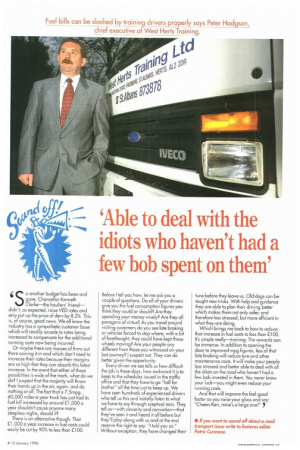'Able to deal with the idiots who haven't had a few bob spent on them'
Page 37

If you've noticed an error in this article please click here to report it so we can fix it.
6 o another budget has been and
gone. Chancellor Kenneth Clarke—the hauliers' Friend— didn't, as expected, raise VED rates and only put up the price of dery by 8.2%. This is, of course, good news. We all know the industry has a sympathetic customer base which will readily accede to rates being increased to compensate for the additional running costs now being incurred. Or maybe there are masses of firms out there coining it in and which don't need to increase their rates because their margins are so high that they can absorb this latest increase. In the event that either of these possiblities is wide of the mark, what do we do? I suspect that the majority will throw their hands up in the air, again, and do nothing at all. The fact that a 7.5mpg, 60,000 miles-a-year truck has just had its Fuel bill increased by around 21,000 a year shouldn't cause anyone many sleepless nights, should it? There is an alternative though. That El ,000 a year increase in fuel costs could easily be cut by 90% to less than El 00. Before I tell you how, let me ask you a couple of questions. Do all of your drivers give you the fuel consumption figures you think they could or should? Are they spending your money wisely? Are they all paragons of virtue? As you travel around visiting customers do you see late braking or vehicles forced to stop where, with a bit of forethought, they could have kept those wheels moving? Are your people any different from those you witnessed on your last journey? I suspect not. They can do better given the opportunity. Every driver we see tells us how difficult the job is these days, how awkward it is to keep to the schedules issued in the traffic office and that they have to go "hell for leather" all the time just to keep up. We have seen hundreds of experienced drivers who tell us this and initially listen to what we have to say through sceptical ears. They tell us—with sincerity and conviction—that they've seen it and heard it all before but they'll play along with us and at the end reserve the right to say: "I told you so." Without exception, they have changed their
tune before they leave us. Old dogs can be taught new tricks. With help and guidance they are able to plan their driving better which makes them not only safer, and therefore less stressed, but more efficient in what they are doing.
Which brings me back to how to reduce that increase in fuel costs to less than 2100. It's simple really—training. The rewards can be immense. In addition to opening the door to improved mpg figures, less of that late braking will reduce tyre and other maintenance costs. It will make your people less stressed and better able to deal with all the idiots on the road who haven't had a few bob invested in them. You never know your luck—you might even reduce your running costs. And that will improve the feel-good factor as you raise your glass and say: "Cheers Ken, mine's a large one!"




















































































